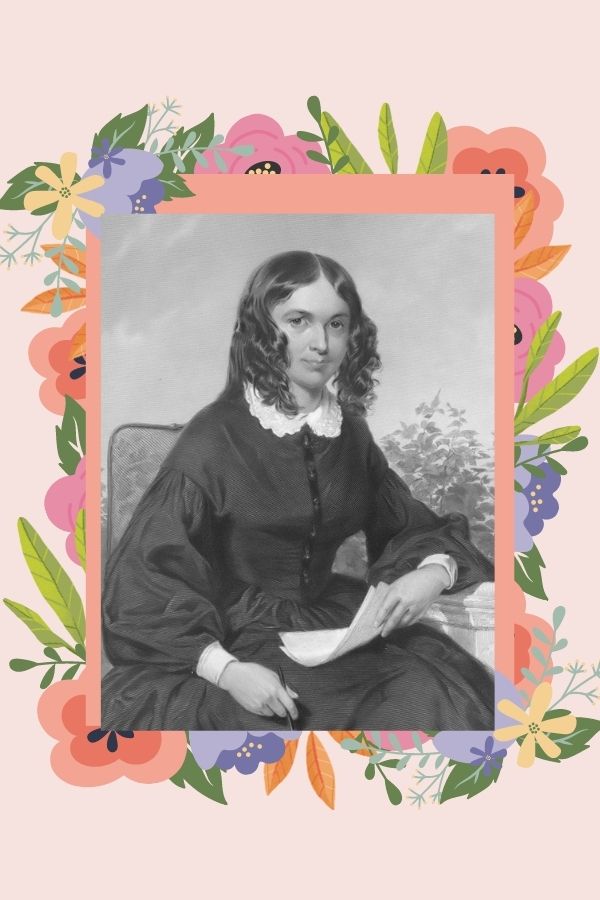- Home
-
Shop All
- Bible Verse & Christian
- Black & White Art Prints
- Book Lover Quotes
- Feminist Quotes
- Book Quote Mugs
- Fine Art Quote Prints
- Inspirational Wall Art
- Jane Austen Quotes Prints
- Jane Eyre & Bronte Art
- Love Poems & Quotes
- Minimalist Art Prints
- Nursery Decor Prints
- Other Options & Custom
- Poetry Quote Art
- Shakespeare Quotes Prints
- Travel Quote Art
- About
- Blog
- Track Order
- Contact Us

How Do I Love Thee: The Literary Life of Elizabeth Barrett Browning
Elizabeth Barrett Browning is responsible for writing some of the most romantic poetry of the 19th century, which is still often quoted today in wedding vows and anniversary cards. But who was the woman behind these words? While her writing was full of sentiment and passionate intensity, her own life was just as passionate.
Read on for our short bio on the life and loves of Elizabeth Barrett Browning.
Elizabeth was born in County Durham, the eldest of 12 children. At 3 years old, the family moved to the lavish estate of Hope End in Ledbury, on which her father built a fantastical Turkish inspired mansion.
She was home educated by a tutor along with her eldest brother. She began writing prose at the age of four. She was a very studious child and developed a deep love of reading. Her mother compiled her poetry into a book, with both parents encouraging her literary pursuits.
In her early teen years, she and several of her sisters came down with an undiagnosed illness. They struggled with intense head and spinal pain which caused a significant loss of mobility. No treatments were successful, and pain continued throughout her adult life. She took both laudanum and morphine to help with the pain, for which she developed a dependency.
Elizabeth was deeply involved in the causes of her time. She was opposed to slavery and wrote several poems supporting the abolitionist cause. She was also an ardent reader of Mary Wollstonecraft. She later became engrossed in Italian politics and the fight for workers rights. But it was her involvement in the abolitionist movement which hit closest to home, as her family were slave owners in the West Indies. Her father and uncle continued to own slaves until the Slavery Abolition Act was passed.
In young adulthood, her family home was sold and they moved to London. There she was introduced to many prominent writers of the time, such as William Wordsworth and Mary Russell Mitford - the latter of which became a close friend and mentor. Her first volume of poetry, The Seraphim was published in 1838.
Between 1841 to 1844, Elizabeth’s health improved and she began to write poetry prolifically. Her first volume of poems, published in 1844, was a huge success and brought her much fame in the U.K. The poet Robert Browning read them and was entranced and wrote to her, his letters showering her with praise.
Robert and Elizabeth met in 1845 and began courting. She was six years older than him and effectively house-bound at the time due to ill health. They married in secret in 1846, for her father didn’t approve. Soon after they moved to Italy. She was disinherited by her father for this, as well as rejected by her brothers. As Elizabeth has some money of her own, they were able to live respectably in Italy. They moved first to Pisa, and then to Florence, where they stayed until Elizabeth’s death. They socialised with a wide circle of writers and artists, including William Makepeace Thackeray and John Ruskin.
In 1849 at the age of 43, she had their only child, named after his father but whom they called Pen. Around this time, a second of edition of her Poems was published, this volume including her love sonnets. It did very well, and her fame grew in both the U.K. and the United States. Her last published work, a verse-novel called Aurora, was published in 1861 to acclaim.
While Elizabeth has remained one of Britain’s most eminent poets, her work somewhat faded in popularity in the 20th as her style of poetry became unfashionable. More recent criticism was directed at her apparent lack of support of the principles of women’s rights. Her own belied a different story - that of an independent woman of formidable intellect and literary prowess, who threw off the shackles of her controlling family to pursue true love and build her own life.
One of Elizabeth most famous poems is How Do I Love Thee? (Sonnet XLIII), from Sonnets from the Portuguese,1845.


I love thee to the depth and breadth and height...

Quick links
Search
FAQ
Privacy policy
Shipping Policies
Terms of service
OUR MISSION
At BookQuoteDecor.com, we’re passionate about transforming spaces with the magic of words. We create premium, literature-inspired decorations that not only beautify your home but also celebrate the timeless elegance of written language. Our mission is to bring the wonder of books into your daily life with every carefully selected quote.

Leave a comment: